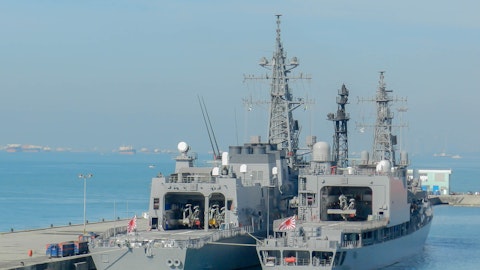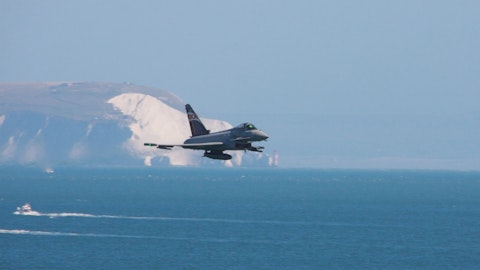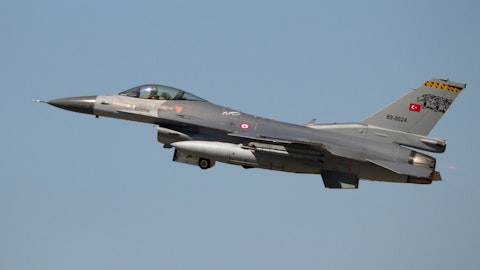Scott Donnelly: Well, I think where we are right now, Cai, I mean, obviously, we’ve just come up the SkyCourier program. We had Denali, which is in certification, that’s coming along very nicely. I think that will be a spectacular product for us. We did just announce the Ascend which is a pretty big program. That’s — and so I think, I guess, strategically, Cai, I think where we are on the sort of that Latitude/Longitude family are in really good shape. Those are both relatively new aircraft. Certainly, there will be upgrades and enhancements to those programs as we go down the line but we sort of have turned from a long period of time, a decade really of making major investments in those mid- to super mid aircraft and have gone back now and we made some pretty good investments in some of the turboprop family.
And again, that light to mid-sized jet, Ascend, I think, is going to be a fabulous product for us. That kind of fits that space where the XLS has lived in the XL before that for many years, home run product for us. And I think the Ascend is going to be kind of filling those shoes. So we’re really excited about that. And again that Denali is going to be a great product that’s, I think, doing well here and going through the certification process right now. So look, we’re always — as you know, there’s always stuff on the drawing board and ideas and plans that we’re always working on, but that’s — we don’t have any new announcements for you beyond that stuff. We’re pretty full up right now, actually.
Operator: Next, we move on to Robert Stallard with Vertical Research.
Robert Stallard: Scott, there’s some concerns yet again about the outlook for the economy and higher interest rates and all that. And I was wondering, in the Aviation division, have you seen any of your customers starting to get a little more concerned about their ability to take jets and trying to defer things?
Scott Donnelly: No, we really haven’t, Robert. It’s been — I mean, if there’s been a cancellation here or there, it’s none that I’m even aware of here lately. I think the demand is strong and look people are thinking about, what could you be a 12- to 18-month softness in the economy. The reality is right now, people are talking about deliveries that are out way beyond that. It’s just because of the nature of the backlog. So I don’t think — we certainly have not seen any impacts of this shortsighted kind of, hey, you guys what’s going to happen in the economy in the next 18 months window, the deliveries. People are taking their aircraft. We haven’t seen any problems there. And again, from an order perspective, they’re out way beyond that period that might be of any concern.
Robert Stallard: And then similarly on the Industrial side of things, what sort of demand pool are you getting from your customers at both Kautex and Specialized Vehicles?
Scott Donnelly: We’ve been seeing a very strong year. The Kautex side of things, North America, in particular, has been growing. Europe has been growing. So we are — we’ve seen nice increases in volume growth here in 2023. I expect we’ll see that continue in 2024. Obviously, everybody was a little bit worried about the UAW situation. You see this morning, it was Ford has got a tentative agreement, which is great. We haven’t seen much impact from that yet. And hopefully, this will get resolved before it has any kind of material impact to us. We’re pretty diversified in terms of the OEMs that we serve and particularly in North America, a lot of the Toyotas and the BMWs, Mercedes and [indiscernible] in the southern part of the country.
So Anyway, the volume does continue to grow at Kautex. We’ve seen nice volume growth in the vehicle business as well. So for sure, we pay close attention to sort of the high-end consumer, if you’re going to have a slowdown, adjust accordingly. But all in all, the golf market, the commercial market, it’s staying strong, even in the consumer market, which it’s not as strong as it was as you see most people and say ’21, ’22, but it’s claims are still quite strong on a historical basis. So I think the business — and that’s a lot of the intersection of all those things is what’s been driving nice growth for us.
Operator: Next, we move on to Kristine Liwag with Morgan Stanley.
Kristine Liwag: Scott and Frank, leverage on the balance sheet is pretty low at less than 1 turn of EBITDA. Free cash flow is pretty solid. You mentioned the demand environment is strong. I guess looking at the stability and the strength of your business, what’s your appetite for either an incremental outsized capital return to shareholders in excess of your existing share repurchase plan or some sort of transformative deal?
Scott Donnelly: Well, look, Kris, clearly, our focus and what we’ve communicated and what we’ve been executing on, we did again here in the third quarter, is really focusing our capital returns around share buyback. And we continue to do that here in the third quarter. So it was another quarter of strong turns. Obviously, we agree. I mean I think our balance sheet is a good place. We’re generating strong cash flows, and we’ll continue to use that on the share buyback. In terms of any acquisition opportunity, like we’re always keeping an eye out for things. And if there’s something that makes sense for us, obviously, we have a balance sheet and an ability that we can do that. Obviously, we have to convince ourselves that, that’s something that’s good for our shareholders.
And there have been a couple of deals out there where we concluded that wouldn’t be the right thing, but we certainly always keep an eye out and contrast that versus just continuing the share buyback program, which I think has been very successful.
Kristine Liwag: Great. And maybe following up on what we’ve seen in the industry, Embraer signed a 20-year licensing agreement to service Pratt GTF engines including the Airbus A320neo, considering your strength in services for business jets, what’s your appetite to join that engine MRO ecosystem and expand your addressable market?
Scott Donnelly: Yes, I don’t — I’m not — I don’t know all the details of that. I mean, we’re obviously — we work very, very closely with our engine suppliers and making sure that there’s great MRO capability for them. Obviously, there’s engine programs, which we promote with those suppliers. But I mean we love our service business. Our service business has been growing. As you know, over the last decade, we’ve taken a lot of this and do a lot more direct service around our aircraft than we used to do, and that’s been a big success for us. But getting into the engine MRO business is not something that I think would make any — it would make any sense for us. I mean all cared about the engine in the world. The value in engine overhaul is in the parts and those parts come from those suppliers. So I think that’s probably best left to them to manage.




